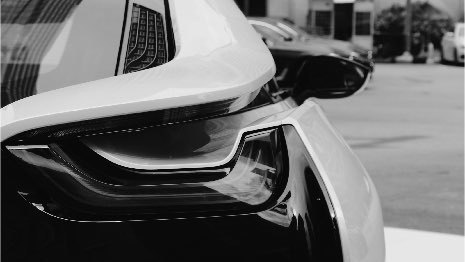By Mark Thompson
Millennials are a generation of renters who have nearly obliterated the need for a car. But despite this, the desire for shiny new electric cars is only growing.
What will it mean for car manufacturers when the number of millennials buying cars outstrips that of Gen X? They are a generation that does not respond well to Jeremy Clarkson and the existing totems of motoring media.
Y drive?
The din of existing car magazines continues to feed a mechanically-minded tribe with a blokey, tire-kicking format that does not speak to an audience who, if they are lucky enough to own a modern vehicle, will never need to look under the hood.
Millennials think differently about motoring: we are a generation of renters, not owners. We are the generation who signed up to those first mobile phone contracts, paying the handset off over the course of 24 months, Spotify subscriptions, Netflix and gym memberships.
Many of us will never own a home like our parents did.
We will rent our entire lives and if we own a new car, it is often through a financial plan that does not really mean we own the car — we lease it, until we can upgrade to the new model.
A recent study states that 83 percent of newly registered cars are being financed by PCP deals and millennial PCP ownership even though the need to own a car is not really there – weekly shops, along with pretty much anything we desire, are delivered to the door.
FaceTime and social media means we do not feel the need for real life visits, and even then, there is Uber to deal with that.
But, those things aside, our desire for a shiny new car has not been killed off entirely.
We crave the next thing in technology. And while often, we cannot find the money for a mortgage or pensions, we will always find money for independence, mobility and experiences.
We clearly identify the value that having a new car offers and that is, in part, why we accept paying so much with no real owned asset at the end of the contract.
Let us not forget, too, the lifeline that this kind of ownership brings people who simply could not function without their car to drive them to work.
But going by the stats, paying £300 per month is a small price for entry into this particular club. As it has been said, “Access is the new ownership.”
The appetite is there and development in financial plans will continue to make having a new car more affordable, but what does this mean in terms of what consumers want and how manufacturers should be communicating with millennials?
What do these renters want from the brand they briefly invest in?
Auto pilot
We want vehicles that let us “go anywhere” and “do anything.”
Mercedes G-Wagons and Land Rover Defenders, which ceased being produced a few years ago but a new model is planned for 2020, have developed a cult-like following, pushing their desirability and price tags beyond their technology, design and comfort.
Luxury has become accessible to almost everybody, and how objects identify as luxury is blurring.
There is of course the price tag and limited accessibility, but it is becoming a little more complex.
In the context of a city, a Land Rover Defender is the ultimate signifier of wealth – capability is, after all, luxury.
The rise in compact SUV demonstrates a thirst for an object that feels like a specialist in every situation and has a level of grit above the rest of cars on the road.
Road trips and adventure are so ingrained in popular culture and transcend generations, each with their own iteration yet, we seem to only get my road-trip guidance through lifestyle and travel magazines.
If we can see ourselves in that car, with our young family or friends through an elevated lens, we will be halfway to slotting that car into our real-life story.
Traditional ad space on platforms and editorials millennials are reading is not enough – it is not a voice.
Manufacturers have the opportunity to develop partnerships to generate smarter commercial content that guides, showing the millennial consumer how to use the product through their aspirational lens.
Hybrid and all electric-drive vehicles are expensive and despite people’s general will to do good, they are still very much out of reach for most of us.
It is also a fundamental shift in thinking for older generations.
A car as they know it should not cost this much no matter what it runs on. But for millennials, as the first generation truly exposed to a viable electric vehicle market, it is not such a leap.
WE WILL happily pay more if we think it is better quality, better for the environment, and better for us.
There is no question what kind of eggs we buy – free-range.
A flat white made with organic coffee beans is worth £3 to us, whereas our parents will stick to the Nescafé, thank you very much.
Combining the go-anywhere, do-anything philosophy with EV can only be good thing.
Manufacturers should lead by example. Show us how far they can get us. Show us how often we stop and what the true effort is. Is there a network of charging ports out there? Show us. Prove it.
We will absolutely spend the extra on an electric vehicle if it is both the free range, organic choice on top of being usable/capable.
From The Wednesday Report, Summer 2019, produced by the Wednesday Agency Group.
Mark Thompson is associate creative director at Wednesday Agency, London.
{"ct":"4EEmURpygnfllv94iduu6cQ6MiIB4ONAvctHUIOl0x8DMqo6LunkC2M4hMxNC75TRrUkd45eha1nxLsxWAyCa3gMbAgZrl8+wFktnYqdIyiEfj9qbJnJPVwrhMkWVIs5gTFIGiL\/f4nPRNeGkz5JcYC5009g0ahnoQRKJYsvVzLDLTrLo0s2TTg9J4c3+95yv+00py5AXZBWn2pLQjhkydymuk7IqRFFq2fR\/j2LrKsQrfVnWt8RNOveIXzVYTaGGvshMNe0leD6vd16\/CtwZY4p1weM7JAA3jeaTBvVtbNPaUwzHIbz5CCFt+UeBo34+bixzFkq17QBVaH6Kje4nd\/54fFn7CMDLKfjUTNXfzC3Gjwex6zxrG8birVD2ndp7hAAdcA6VCelxRqHJ7C\/eLi\/wuxfwChkvtZ7zY2xc4BQxRanel\/SBxc33\/dLZ1xD7jmTCUs+IF7XzEQLAR4g5SrKDkkkTX52soJ7RltRdfLdbXka54IDTGP6AXHCaOMlCpTrfD1KydFpdGXzaEDinejKzETS5L1HeBfVgF2q0V7LtjcvcxQtpBP98SglK8\/SwOnKxqTy25TZCZhkETPTTlSlqg4t4E9+vUhG2YWmmAjzGnLQXpwEUYM1o7SfBRaxzPwgxa6l4eiQTLdLvbQrVZPaYWXwgdEcBpjsHyAYwUJMQREegGUKjHP+AW\/8IR6RK4TSCkaCM3D9FcHV0kptQgIIHI0e3pbpCihrF7t1y4bYzQDodfxSQTsinf9Mp+cIRub8GSPRD\/m46jVXYb6ouuB6erW8+Yt+jgzYTRproxghx4TCpyvdjA96Fjag7QOYq\/FxQLSBdJW2g5CIq76R1WfbtbAuCHhLOV4cUj63XtoY7hfHWnooO0LlaXP716EKVdZEX6hxAg3eN5whtVg\/sv5h50fKCEAGv5pIYU2Iy4gvrL3OUegEZsXGwd9DveqZNe5kWQxtJdWgAuex\/00TLOeI1hZLZqYmDBSniedYSicLN4nYxn5DFe5rcqR9qHYiW6UI9hLMDagaMam+fOKx1v07cmczF9EYWacmbiBgQIg+pY4zae2cSNlLwm7h8MYdBHrMlXwNqs\/ZA60MuxHskW4OIyHaMhwA6yHoivUPtxb\/zCh7Sd2rrgK7s0wmYPm6V9CHuKOyW9pfWl6eTI5vk\/rdUFQOZBTKwvdoXbsCvmSq+t6HSVbh2ZEBasZbZekRE\/Oqwg243qmBD2fTH5MOPvgCQXIS64xSzl\/1rgBcQ7J7ix3szzc8\/JevzDicEFNBkqcrzQI+zPK53vObXxgcv+NdWp2kDpVFl71JCc9eDz+hBef9pfS30mh8wiEXcERndLrZr6ITRuhbLQ3j3CRcTaDkrIXHRUJbPiqO+GKLQxa1p7rEry1RzemOzuNU2odpENHGPHsr4n8qU3Dr5ALdA1xRzuWCqLTGrBdyuzn\/C2vCZ2m\/6y+kKJ4bqJUtK9DKCvKIWegDKmIf19TL5sKBW1zDQ9nHnGF1MohtLg\/6l1CXHufUgdjB3ugifJNZx0uDO5KOJML+mhJHIK7ZI\/qAfgu0yjNQfPxgiDTLO4OkUJA3exjNDAOc4VwjXGO+Pxpxdet1YsNH2900GFKGWgBWAgJmM88G8HMa4xUD1sch9UUziryRKqZaBPIosP007aLiM\/Ex0amzmHs+FuLOVPH7zFOqdZ\/YNosnBQMIWvlVWzJH5WRbFQYc8zz0pYCWAUTMCOIOhgJdt5BY+xb6t3YsD8PHAazsyf66FAHQmiWyK0clPNX3FaiMZrWtYpuxnXPdI\/bgT0R9GFCFF3k+vhyKQDJVm5gWpqIU+IqyQ2RayMeVJYBXBN++gUz2EJY6\/LAH610J+TFgt0LF1Bq8IRUUSM2Ce81N9CsKIcf89FqxgwlaHv17UcNRFumbw5irSdqYV28r6uOIcy2EMlf4maZi8DxiFMuzmp\/qbzWZcphzMMp9Wa6TrzRUs5yTg3WcqFvq\/x73NbUnjS3bTyJqJn7CYPR9ubaw8fmtJ2WzP8MwpesAP1nMKjcDOxDt8NUTQMHapY+4HGgs2d69S7pStOq2XWsP1tHSaF6t+yfQeqFukJvOUzK\/F5NJFdxytBFfccqCcRBFTgPhREZaTf7j4A8cgZWyu7HjY25Id78Ea0+I6Cw2VSzbIlvvmILKrKRJRTB6lm3tg8C4bwQkGOpstGy+kXbh0YyqDAw5T2pMAgnu+22sep9b\/1K34qDXRtlGx8iPYMeFvug0kZgmoIJ8yxH\/PNE7G4oOlQUW4sfczXYfguxpxp9MaJwQEY8w\/s\/hVdhqjkUkkKj7H+x6Do4SmVnrm8R1h7YJ3yT79HcwzMeXB5tzNYphnih9bT7Z3fPKjTAu6cAvp6Gqq2lUuNoAWERk7gxAJvlD6\/B1zi3E1BxmmHcgCr1Tv4kDksafMnbzoQdqkxT56Igc3YUXERb6ckxuOLTC1jC6XfcdBchV6qdVjJV5RkZk\/b3b4mfEmVQElfaNZd+8\/eOC+kWcY0y1ZIlsc7UiZb+0tBcYqrRhb7Q8N7VzP4QJHL8jjo3jAnRyi2XfF7s38tv5vOpo3CCk6bXsRZ8t+uZxt7ukYh1nwGi9sP2XZ2cRWB2PJPApu4ta3oYBKifDjzhxGdFvY9bmEHEqbSi0EfCcyF6ac3SZVcpipCBfkzuzO6DEP\/gMuO9MN7PP7j+\/RY+g8YyrXimOSzU\/TOJZ957W4U+RxyJTCrM3Pr1XCJPJ4VJT+5RBGDE3ds+vHCHkDdlGwzwjENzy7lH8T19Hh60y+gAfytIFHkmcDjoAv+Dw3lERAtW6MN\/jxhyhYg7+DHeKTVCuYnX\/4K+1L6ssLCv+10xX9rrUUV47OjZUfBzrrAAgtLCKdJT9sB8Q2fEt+iagHzoZjWsVX8a7VVTfYksN+jjJzk2svx1zHADC7cT4kiQ2d246Vwz+EJ4jKgEi81GV5oDcH3GEHNy9lrlUHyYn77F6gsbFh1WNlKxukDl0CCGwd2PhttE9Yn9izG7lP0FGZPWTXyNSV78Rq6I+GvVVyEBhU7mDzsGtfiV9GWvn3VMJN3Jv3EryBCYITvdYI19vOf5lusbgbDVVFP91piSh6Z9Od9oIFZZP2KfpJ31hlgtxCjo28lI\/Phchs7zvkDDXZjm4RMgDABHYFGp2f6OP2DTYEkCqOxwgsFdk8UCSfiEAAZSXy7f1+3jxiNQIYCAGZeXopRxXBAcc7rRyzX8BJTkw0ZWwuDgxwQmY9E9FeSGO8EJo6DZaZSCJeAEMP2AbIlLEJ5C+7\/M9sT6XMrWm+WvtgFXSr9L8yruWngNvWIeCMovHiC+vIyfsvqY3bCcv2XLrQP877Fz4A0qMwZ8Af\/w1axx7E2312JdW5aVDNqnbuLaqp\/RfQsEwx7qvN\/VUGx4jwu6\/PDemfXoqOlZTLlOOIIw2dG+VQgLh5Q9A5WiGCLNc18f8XFzxkHApXedshLYxl\/bcBN7Vqq\/GQW4FM1PhRVMQQAY7F1ykSsoF05kxeyiqmLlf0FDABI02fH7njr2K16ToQQr2C3FL\/k0g7ABriF22V1QFP0K7NuSY9Q7Bd4+51JzTSngZcaWJmOk2dMnzZbPqqYCn3aGuHLhjdX8DmBNhhIEF7i0XmDkm1C+qOJDvmnl59ecF4U9JW9i9SpHzAhvztOS6\/nyFfmGlUcgKr64nZfo6N0d+pmc+rcl5SUmx5twKx3bHdjEFEVbzAWss6vlYSh+k5kMZUNzYLy7En4gFuQe+NGXuIcJN+1O5NawlKM50xrpKUy55nHrJYVS4IiEL4Cy8KPjpe7Msju\/FRP5hgyqpBDGvMdXEV\/hKkP5anG8vrmhzMylA4mSEQlfyQ+Cr996rYg3E4672uVcw7wMs7VL8pMzodu7jLEfaIwgd8c9\/zOls\/7xqOHil2pLFgKvFw1W0QZbutqJuFYDA0XYU5t4\/\/MPH4VV5e8ryX+KqKr099CqNYHaRyEUnbpO5fZm2xqTYj6YueQmC7jehbVyd2pzqa5XxM\/jDdjCVbkEdkOEJCYZptQLr19VVwlVPq6aCDfMzpA4fthKPzYnnls0eSDmBO+Vv57AKIWu9N5\/Rpdzl9ORPwZj1JuC4tvqRLLy8kPyEI9xhyvyNsMTrOxnT3RpzXD4QyWlpKtVuT08th7Yb6FGrZd5ov8Ek5XPZeCK9ZViztbfo4sC0FY+V\/epDFsFsyLgqZSPdKNwk8502HZHaG5iKozdfgAyowciMQQshUN+RCCaOjDO90nZIJ8tupBOP72q3BMX4hzeHPqqw9+YMNllLynYAgheAasuuV9LK+IEExSCSfrDlHVfWl8KOdBoQz8\/h6T5qzsZ6m94S42RtJAEXhFJVMoZCDtHN0T\/L8BxJ1ASIBvY4dlDe5MDikCABrlHuGR2nKQ+usK94mpaeY1KTLA14rhhUK2NRsJEDTwxmDdqu9IsjV1bkksmXKlf3+JCYcSvveL5sjBCUNCVayq0cx+0ZdF2mjBfT7clcz4gUglKOHdri28AWn6TvxOc4s8qxs0xfLDB0jeSlzkrpRBIgfMDErYCq7QLzFzjB3r1a3rBfsQ41yvjl\/DoiT28zOnaupOIjR5cP5mHnfwhbJL88Vp3v1JgMnAdeG\/tHMO6qZXwrulc42afNKtdxj2BYdxOZPI9pjLckYPclIIfj1yjh017v6BUilR0r6NJGKkodaHA6meBj4gFiRna58H4zOU5WznSj0abWht7IQWLp24KKb3Dzy145oePBC7ciiVYvhbOCnQdWQDcg56cMXyMIYxypsQHY49mVYBdk+o1ckbpjEGyeCuF65Beug6Lq4Crdx52wdC+ZTrZZ0kHT0qfXmCoKF+uJ\/qtZtCigQ7rqDg2IrlxzsIfor8e1AL5082HiTTiFgfPNxRSi\/X\/B7r0AU+qtxzZj6hXWAbGV30k2kinFY\/yvIkRZplnzPMARK3b7JFup7QDol3eTq1892lyM2jK2WJe1wKhhb\/uhc0Bz25m6vAUKQ2Exred4YZf90x0KOpl6j3UdG1LBv\/gOhMtJu1iOTNrmac9ch6NZ9QiMp9N4hO3nRi+I8g34KPec5BcVnZudbvRIQhxDSniqCUu356ryC3RGGoKrV4jVrTPaSYMntwDWxXUiKozBU7P92fu735BiWjToFhul7OyFMw85wriQ9UUiP3gPyHmiI3jDZUlK7pgjdUHMUr+PxjqyLv5V+HXnRCmspidmjwuga8AFW3bl2a22v7tUoNolf+h5io8cmNvfnwh4ks4J78YQtnZ+cyuLUr9FijtQFQV3\/A9oLhMoqzkhQ3Mmuw0tqsLdtQZFIMfd2L5Ko1c1c7WCYlIv98NJqtxs10yW33x8yjQB6vasrSo7J3C+OTUHAcSs0uSRQ9KyD6ZwoiWQ0fPLM3rSf2GdFq5O7Erp6w0ryDmbHG10YxODkOZ4pOvfA+O6wi1z0Z0a7aSbCcb\/yEQokzLSSvgP9liBEYQtFaj6WCKpFnn929vI98ZiO194ya+3nSX0BPaWz5MMXxrGx6odNlzOgymrErZzf7WpUGTibB2G2SNk0uxktuqwBA4OP6EW\/xSwjXkuIY2FcvZW+Y7wHk\/oudO2uxHDP5R1jVz0B65Y5HAh21O8o2VBJmJkVHMEIAzEDptiw934xVyI\/qGttlkD5V0MgVDcaacC\/Gb+xcAK8iN+tX17trtUPwyee7BfXwMtYH1EnBdPUVvW7eFPL3T0CZJAy3kbpajCfaor\/iMVbGtFM9mdOfoABFo1sUl1AZdTCXi2fLMHYNyLgwuoVTjHnqsc0Co7JmhO83HZslf25yVW3Fc87FaBeZg474J+2H5dTwvFW66GrDLfThaUYgG0SuDvdrb00iLfXBrdfafT7tKHyvk\/gcVI6+U\/jL5y7rPSBHhzl5XqjHrSQ3q15D9xrOuUfzdwa7FQHtG+Z\/doM1MyNTBeNxjw19IiMkYnyoCWcaCs0P14nFuvcFMGwezRbQ850KtNJNums667uunLMUUaNRdLCwZEGG0BZOaR5Cu2qizdQANO8YvmbTcKjSwi84cr0gxpsCLduHnrDoiHQyZN2hM+NTChwH1VHxhpO5wM3ALHN2Jz7sp4bOPkvE1Uuz4qnXM+\/qm37nhKUuqLWq9YWAXgEJIdv9dXbTZnVZ7H\/nZURCJliZGM29FgpjEhUsO4QFyVM6ovjO\/Mrc4t+MgrvXjIk8+Rh64lTTynjO6xhowjq1wvGZ+0J\/ycTTQullr\/B8GS+31jYL4mQtElGfJsvM+vuGCTNEBZVl5TjummZ6I+oqCx+Sg1\/LTdIDll2uy2aPOCNyjHZGXXqQdSr0C+flh3p2OczqcB7QpD7L+zxNaY5tNkLxOjTiAnAeGOUXdo5SDXYIc5PwZIT11OaVfDTKfkuMGKYA2ye5jUJwRxFklC\/bGrx7BnAmza3JGsGpyq2csa4lQk2IP7M42QW3Cn3TBa18S6P0gJoyOtdzE7qoL8vg1i\/AZs7\/kkLlnIwAFwgYQP3tvtJ5OAMSjmU0GWsMpDE5ozps9wlguIIuWdi\/OoY3KaqSnk2CNavz8L0ORPG0G1zdZ7csGuem3uXDRiYiPi\/YU800fOK5dylcoJYF9ijSf6YhqU8qiRbC2HW8NYlj2pHttSVXJHJ4gN0GlQ36LW1olQU3BkoU54ClRVsAYIq0Ub+OtEV8V9aKjiS96p8OTM5UAbo33QNGCnYFEzx\/VT\/YGXpc3J9lfKp62ef16Gn+2NfOk32nrPYmiBUDJhbBjQ4dnGuCi2\/OIB\/TDbcOHzBX4UNDSREZi\/5CZDtNKCSMsjjYUKqAkUkIxq6pbwDZoimgRu2znAq8K34Pu2\/qgwhohYa5SJy3UMEbTDohuKsjaX8Ra3rcrzOuDEGGwFrMzD+5uC+8XVMCSMuw4jvhRuVR+jRpTpcjXRiMKBdUzbvZS4U9CtAHcUlSEVbPQ9dCsuUGTgcUGF+NjgK4xUh+VH9DgJ4nZeXw8p3WV2m0u6YS86IdmvzlE64An\/Gz7HIdzbSS6JZwtqjCjEdNZ60nCw29xmQm0hbGVXojF\/I2SPiLmdKT67TMQfH5vzHTHj9LeOPuzARK2lsRo\/PyXdxrsNbaP\/GZs+5c7f7yeXXUmidOxm4WblOMgUQ1gY43vOZbjnzfNNK84VgxUxXtD0Yh62t01lgQkZfNSU8jUAD7SXHNwXlqiz0qEvSYdvIcpv858kIVv6E9cPw1h\/O5bmuezHUG0ECeD1Lr83c3p5vZEb6hG\/+vGj8f43xKtJ86sONp3oqpy930NT66xlWh4\/UIx4Tbb20YVA6zP598xlOeW1NT9k2\/Rv+5TVrpivqgUbnasOoSBmsjC9TpxZhhUITECgrHKMRZaOYtJC3PfU4I4DIoDCj6+88pexoEQszHDls0UjDJsRlIQH+whCeLjZTF1Myg3yiFwCIji8KTXCuQSgJ\/7IrI4+nTw9CzCaJSPWYPSiwZCpfd1bm3kaV4\/MwqQ71COcj5DuDev5Wru7rY1eNuehx\/x15+ocO+MML1WTvtCgJnO6BekU59t3j\/GeB4wo07vfNJmNdXxBDgQtCvEBu4SxvVPOPAnqoOhJAW4\/JeecpGkW1msKFkY9E4s7914+5HBjf3wz\/aepyIzxAKrSL9MCrEPxFzAoJ5Se5VStXFmUIJuqKE0sF1nJhc0Vmgz5kldfxc6iO7bE3wiq4Gt4\/k0RP1Iit46ggCzjWzky4mDTf\/r8jE+l\/hgRVSAUVrpPc3O4O+Jay\/EkpO\/rPZbJ60hcHZxxN4ctyGSQwJ2c9Qe6es64pwsfl3FAHgAsZQHQz168tF7Q7bvX6bOXqs08Y0cmXePL05kx4LnqdYYZqWhRgd1TIzvDvRdsL4mwArhOu\/Bq\/7pAtfxT1vCuGT7nq8HAIw1t0JKTsbI\/1GeYxVdpFQi59KZ3gUdBicdVMtJ4fVe1NOKK3kX8eL0E3lyyYJzo84zBjh\/Qr9Q7zsg8Esw2InfTPtqW\/5CmAzfobahsULVbYT1u9OtRKjhBhFOxNT+K5UiKxDwm7sedHUQiA9VXrtkLxkeAjScxdu40LBEEphVqxLaGKCuJrjZa7sO30Ixz1oABoFvibHjogeX5+FAfx6L6nK3yrY4BBBgdLAqZGIS699a1LFo32Hve9I1r29CY\/Y3HMo9V7oK\/7uQqTSnkM78c3JE0wih3ahnMtjvBrullCkVplmg\/jeSDayxqt7g3224IeO+r\/0dOEwNdMzj8+RNKKVRlkGc8pR85yIigbxY2TfJ02vty0AFDWNQu85akm4UGSEaRrYRazlCtwdBmThoUZfPB+HeTXr5iCNKPQu2QzRxlLmtaYSai31A\/ng+gL7Z67tHJzwvkgg==","iv":"e797e3a96908e87def0640fb739029ad","s":"9b303d62dd660101"}

 Maybe you can drive my car. Image credit: Cadillac
Maybe you can drive my car. Image credit: Cadillac